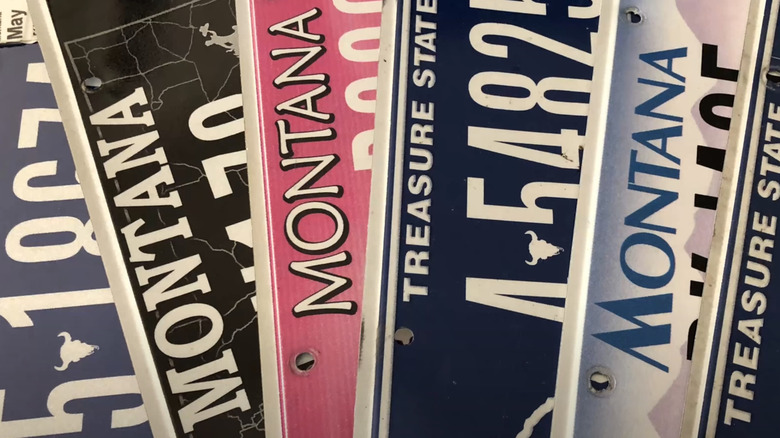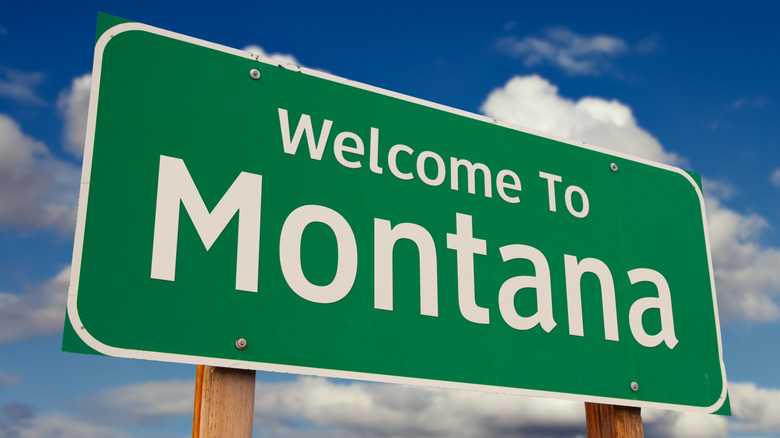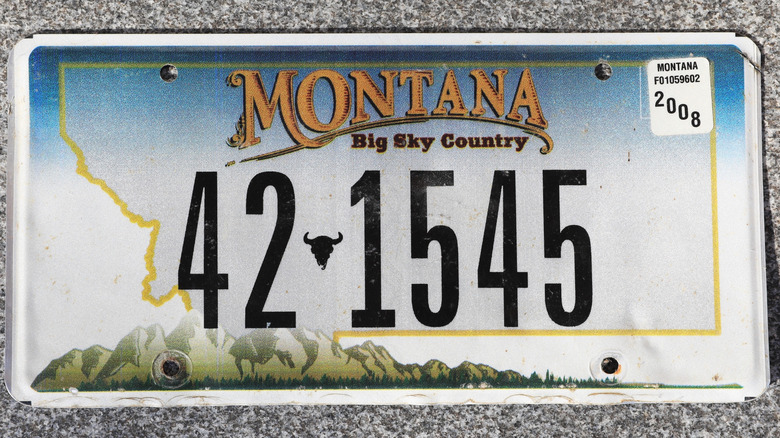Why So Many Luxury Cars Are Registered In Montana (Even If They Live In Another State)
You might've noticed an unusual uptick in Montana license plates when driving around town. You might also have noticed that those Big Sky Country badges are, quite often, affixed to vehicles that require an elevated tax bracket to claim ownership of. In and of itself, that is not particularly unusual; as any "Yellowstone" fan can confirm, more and more wealthy individuals are taking over property in the state. No, the real anomaly about some of the world's fastest supercars sporting Montana plates is that so many are turning up so far from the borders of Montana proper.
It will likely come as no surprise that the license plate disparity is particularly noticeable in states like California and New Jersey that are known to have higher property taxes and stricter automobile emissions standards. But there's a good reason that many of the most expensive cars on the market, like Lamborghinis, are sporting Montana plates outside of the state. Registering a vehicle in Montana allows owners to circumvent whatever taxes and emissions restrictions might be applicable within the borders of their own state. And yes, that practice is perfectly legal.
As hard as that might be to believe, the practice is possible due to a loophole in the state of Montana that allows owners to register their vehicle there even if they do not claim local residency or have a Montana driver's license. On top of that, the state of Montana does not currently require vehicle emissions tests or annual inspections.
Here's how the Montana auto loophole works
According to some outlets, the super-wealthy are taking full advantage of the Montana loophole: Some 10% of the world's turbocharged McLaren P1 supercars — which regularly sell for $1 to over $2 million — were registered in the state in 2021. You can bet you'd be hard pressed to see many of those pricey vehicles cruising the ranch lands and mountain passes that Montana is known for.
Montana is, of course, also known for not charging sales tax on personal property, which is why so many wealthy auto enthusiasts are registering their cars there: The savings on high-end vehicles can easily range in the tens of thousands of dollars. The practice has gotten a little bit out of hand of late, though, as Montana currently boasts the highest number of registered cars per person in the entire United States — despite its 2020 Census numbers claiming just 1.1 million permanent residents.
There is, of course, a hurdle or two that car owners need to overcome to claim the Montana deal. Primarily, they'll need to set up a Limited Liability Corporation (or LLC) in the state to qualify for the tax-free status. That can cost owners as little as $1,000 or so, however, and once the vehicle's modest registration fees are paid, you can legally drive it pretty much anywhere in the country — assuming you have no ethical issues with essentially evading taxes that support the roads and infrastructure of your hometown.
Some states are trying to crack down on the Montana loophole
Clearly, many wealthy car owners don't have huge issues with dodging local taxes. Some automobile news outlets report that there are currently almost 11,000 such high-end vehicles — from the likes of Ferrari, Bugatti, Aston Martin, and Pagani — registered in Montana. Still, some states are looking to close the Montana LLC loophole, with many claiming that, even if it is legal, it's nothing short of tax evasion.
Utah is one example, with the state enacting laws in 2025 allowing for the investigation of residents with cars and boats registered elsewhere but insured in Utah. The goal is to recoup the tens of millions in back taxes it believes are owed. California, on the other hand, is requiring residents to store vehicles purchased out of state in the original location — Montana, for example — for up to 12 months before entering California; otherwise, it will be subject to California tax. The state is reportedly even flagging Montana license plates and tracking their Montana registration date, then enforcing penalties on those entering the state before the 12 months are up.
As for Montana itself, the state does not appear to be taking active moves to shut the loophole down, which state legislatures could likely do with relative ease if they wished. Though some in the legislature are trying to alter the loophole to the state's advantage, the closest it's come as of mid-2025 is imposing a modest $825 fee on registered vehicles worth more than $150,000. There's also a "local option" tax of 0.7% on vehicles, though, as the name states, it is optional by county.


